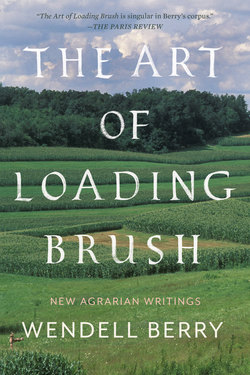Читать книгу The Art of Loading Brush - Wendell Berry - Страница 11
На сайте Литреса книга снята с продажи.
ОглавлениеPreface*
by Maurice Telleen (in absentia)
Whatever agrarianism is, it is too important to be a mere movement.
・・・
Movements, almost by definition, are compelled to be certain or “right.” So it is not surprising that they tend to be self-righteous. In addition to being right they are convinced of both their inevitability and their superiority. The latter confers an aura of both practicality and pragmatism on them. Movements leave little room for meaningful dissent. They regard themselves as destiny. Movements are big on tunnel vision. Their tunnel. Their vision. So, let us agrarians give thanks that we are not part of a certified and accredited movement.
・・・
Agrarianism’s natural home is the field, the garden, the stable, the prairie, the forest, the tribe, or the village . . . and the cottage rather than the castle. So it is little wonder that most contemporary Americans are strangers to the term, the concept, and the geography.
・・・
One reason, I believe, for its being ignored is that agrarianism isn’t just about money. It might get a more respectful hearing if it were. But it is about culture, just as agriculture was about culture. Before it got run into the ditch by agribusiness.
A funny thing about cultures is that they produce people who understand more than they know. Sort of like osmosis. So the old agrarians, to get back to our subject, knew a lot about local soil, local weather, local crops, animal behavior, and each other. They depended on each other. It almost defines that much abused word, provincial. It was very provincial and no doubt carried a load of both inertia and foolishness, along with wisdom.
But whatever the mix, it was rooted in places, communities, continuity, and people whose names and faces you knew. As a matrix, it worked reasonably well. Which is different from claiming that it was idyllic and completely satisfactory.
